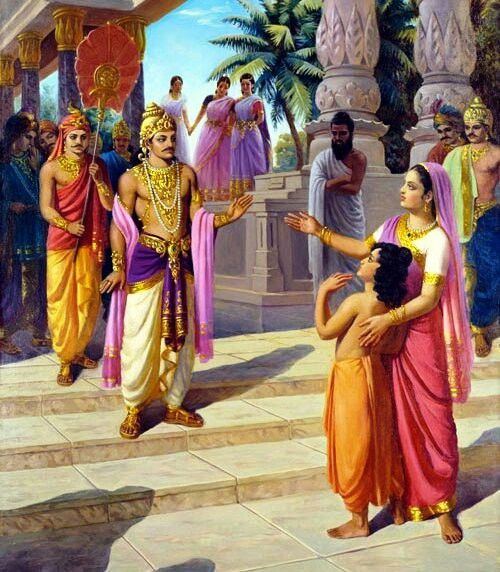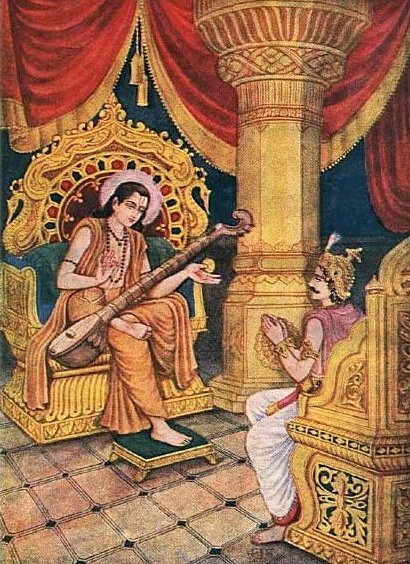
गुरुकुलवास~Gurukulavāsa : ii
Like Vineyan,
The Student has another name "अन्तेवासि~Antevāsi" which means "one who lives with".
Just as "Upanayana" (leading near) means "leading near the Guru",
Antevāsi (living with) must be taken to mean "one who lives with the Guru".
(1/12)
Like Vineyan,
The Student has another name "अन्तेवासि~Antevāsi" which means "one who lives with".
Just as "Upanayana" (leading near) means "leading near the Guru",
Antevāsi (living with) must be taken to mean "one who lives with the Guru".
(1/12)

Strictly speaking "ante" does not "with or by the side".
It means "in" or "Within" in the same way as it means in the words in
"Antaranga",
"Antarātman",
"Antaryāmin".
Đ "anta" here means "in the Mind".
Đ ācārya must, in keeping with this meaning, harbour the student in his Mind
It means "in" or "Within" in the same way as it means in the words in
"Antaranga",
"Antarātman",
"Antaryāmin".
Đ "anta" here means "in the Mind".
Đ ācārya must, in keeping with this meaning, harbour the student in his Mind
so to speak, which suggests that he must have deep affection for him.
The ācārya has a great responsibility towards his student. If He does Not Fulfil it,
He will himself come to great harm.
Teachers nowadays say :
"What does it matter whether or not the student is doing well?
The ācārya has a great responsibility towards his student. If He does Not Fulfil it,
He will himself come to great harm.
Teachers nowadays say :
"What does it matter whether or not the student is doing well?

We get our salary. That is what really matters."
Those who conducted the Gurukula in the old days could not have the same attitude because the Guru-Śiṣya relationship was not governed by anything lika a business contract.
Indeed,
Education today is one step worse than what is
Those who conducted the Gurukula in the old days could not have the same attitude because the Guru-Śiṣya relationship was not governed by anything lika a business contract.
Indeed,
Education today is one step worse than what is
implied by the Phrase "Business Contract".
In Business, If You pay a Price, You must receive something in Return for it.
Now d teacher is not bothered by the failure of his student who has paid his fees(i.e.,The Price).
In contrast the ācārya who conducted the Gurukula in ancient
In Business, If You pay a Price, You must receive something in Return for it.
Now d teacher is not bothered by the failure of his student who has paid his fees(i.e.,The Price).
In contrast the ācārya who conducted the Gurukula in ancient

times shouldered a great responsibility.
What was that?
शिष्य पापं गुरुम व्रजेत्।
So proclaim the Nīti Śāstra (Law books).
It means that the Sin committed by the student attaches itself to the teacher.
Đ Guru imparts not only learning to his Disciple,
He takes the responsibility
What was that?
शिष्य पापं गुरुम व्रजेत्।
So proclaim the Nīti Śāstra (Law books).
It means that the Sin committed by the student attaches itself to the teacher.
Đ Guru imparts not only learning to his Disciple,
He takes the responsibility
upon Himself to ensure his Disciple & good Conduct.
If He does not discharge this responsibility, there is a penalty to be paid for it.
If He cannot make his student Meritorious & if the latter commits a Sin,
It passes on to the Guru because of His failure to correct him.
If He does not discharge this responsibility, there is a penalty to be paid for it.
If He cannot make his student Meritorious & if the latter commits a Sin,
It passes on to the Guru because of His failure to correct him.

If the wife is guilty of lapses, the Sin thereof attaches to the husband who has failed to lead her on the path of virtuous conduct.
Similarly,
If a citizen commits a wrong in the affairs of the nation, The Sin thereof is visited upon the King for his failure to correct Him.
Similarly,
If a citizen commits a wrong in the affairs of the nation, The Sin thereof is visited upon the King for his failure to correct Him.
If the King himself commits an improper act or Sin,
His Purohita who has failed to correct him will have to suffer the consequences.
Đ Nīti Śāstra thus invest
The Husband,
The King
&
The ācārya with an Awesome responsibility :
His Purohita who has failed to correct him will have to suffer the consequences.
Đ Nīti Śāstra thus invest
The Husband,
The King
&
The ācārya with an Awesome responsibility :

राजा राष्ट्रकृतं पापं राज्ञः पापं पुरोहितः।
भर्ता च स्त्रीकृतं पापं शिष्यपापं गुरुस्तथा॥
Đ husband is not to exercise authority over his wife by creating fear in her,
Nor is the King to rule over his subjects by creating fright in them. It is the same case with the Guru-Śiṣya
भर्ता च स्त्रीकृतं पापं शिष्यपापं गुरुस्तथा॥
Đ husband is not to exercise authority over his wife by creating fear in her,
Nor is the King to rule over his subjects by creating fright in them. It is the same case with the Guru-Śiṣya
relationship ~ Fear has no place in it.
Đ Husband,
Đ King
&
Đ ācārya
have to care for those under/with them & have the duty to ensure their good conduct.
If they fail in this duty, they will incur the Sin for the wrongs committed by those under them (i.e., The Sin for the wrongs
Đ Husband,
Đ King
&
Đ ācārya
have to care for those under/with them & have the duty to ensure their good conduct.
If they fail in this duty, they will incur the Sin for the wrongs committed by those under them (i.e., The Sin for the wrongs

committed by the wife, the subjects of the king & the student respectively).
The Guru must Not swerve from Vedic observances & must be strictly attached to Dhārma.
to be Continued.,,,
ॐ गुरुभ्यो नम:।
ll ॐ तत् सत् ll
।।जयतु सनातन धर्मः।।
#WordsOfKanchiSankaracharya
The Guru must Not swerve from Vedic observances & must be strictly attached to Dhārma.
to be Continued.,,,
ॐ गुरुभ्यो नम:।
ll ॐ तत् सत् ll
।।जयतु सनातन धर्मः।।
#WordsOfKanchiSankaracharya

#Đ68thAcharyaOfKanchi
#ĐGuruTradition
Link for गुरुकुलवास~Gurukulavāsa : i
#ĐGuruTradition
Link for गुरुकुलवास~Gurukulavāsa : i
https://twitter.com/AdiShloka/status/1475066674504400900?t=IPHKZpnVdckdo5cpHHM10A&s=08
• • •
Missing some Tweet in this thread? You can try to
force a refresh
















